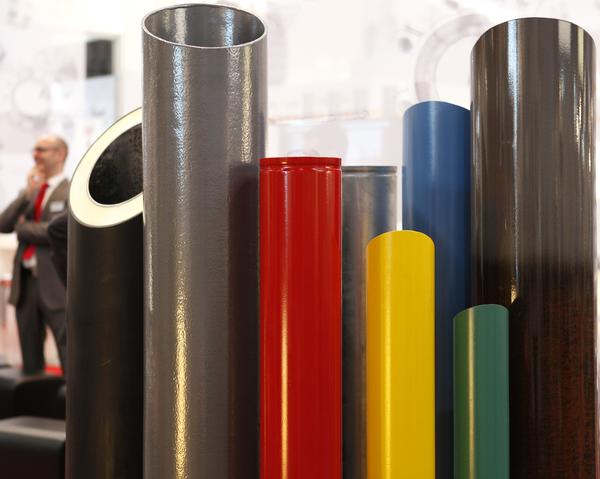Neither fresh water nor sewer pipes can today be imagined without pipes made from plastic. Plastic pipes are also on the rise in industrial applications. From 7 to 11 April 2014, the sector will present itself at Tube taking place on the grounds of the Messe Duesseldorf.
A short look back shows how fast plastic tubes were developed – and it all started just 60 years ago. The first pipes made from this material were installed in the Industriepark Höchst, in Frankfurt am Main, Germany. Since then, they have been capturing the market. And there still is high potential growth. In 2012, Germany was the most important country with a share of around 13.5 % in the European market, followed by Russia, Turkey, France and Italy.
As a major producer of plastic tubes, Germany has been experiencing rising sales for many years. Production of plastic pipe systems has increased continuously, summarises German trade association Kunststoffrohrverband e.V. (KRV). In 2002 output was 555,000 t, in 2012 already 741,000 t. This means an annual average production growth of 3.4 %.
According to the association, the largest part of plastic pipe production, namely 50.7 %, is used for waste water disposal. The areas cable protection, buried plastic pipe systems for water supply and finally gas supply follow.
Reliable drinking water
A look at the individual areas shows that the drinking water segment can always be relied upon. Demand for plastic pipes remains unfettered for the sector, as figures from the KRV show. Plastic pipes accounted for 56 %, or 8000 km of tenders, outpacing for instance cast iron pipes, which had a share of 13.7 %. Nominal diameters ranging between DN50 and DN200 were especially high in demand, chiefly for utilities, cable protection and estate drainage. Here, plastic pipes outdid pipe materials such as concrete and vitrified clay. Even for DN300 plastic pipes convinced users. 32 % opted for them, traditional materials drew the short straw, with 24.9 %.
Plastic pipes are also increasingly being used for waste water applications. Public sewer networks form the largest market in Germany – in an upward trend. For building drainage, estate drainage and public sewage systems “a noticeable shift from traditional materials is taking place towards plastic,” observes trade association KRV. In 2012, the share for the total amount rose by 13.8 % compared to the previous year, accounting for a length of 30 %. Plastic pipes are especially in demand for nominal diameters between DN100 and DN250.
The chemistry is good
Makers and dealers of plastic pipe systems are increasingly putting out their feelers towards industrial applications, which so far has been a small market segment in terms of volume. Advocates of plastic pipes see characteristics such as energy efficiency, durability, ideal thermomechanics, safety, low weight, non-disruptive construction and the high degree of applicability as reasons for growing demand. Continuous development of semi-manufactured products and compounders, “which allow creation of new, innovative products,” is seen as important, states the KRV.
Plastic pipes are successful in the chemical process industry: the KRV sees the “great variety of materials and remarkably good chemical resistance” to various media as responsible for growing demand. “Based on current knowledge plastic pipe systems can be used in chemical plants for the transport of nearly all chemicals with operating temperatures of 100°C and above,” as the KRV states.
Stress for materials naturally is high in chemical applications. Makers of plastic pipes answer the challenge with a large variety of different polymeric materials. Thermoplastic and thermosetting materials are especially used for pipeline construction, elastomers in contrast for sealing systems.
A closer look at polymers shows their virtues. A high level of corrosion resistance and low weight characterise thermoplastics. “Due to their very good long-term higher temperature characteristics, as well their high degree of resistance against chemicals,” customers receive “a high level of use combined with a good cost position,” the KRV emphasises. Thermosetting plastics can also convince. Thermosetting reactive resin systems feature “very high temperature resistance, stability and stiffness”.
Share:







